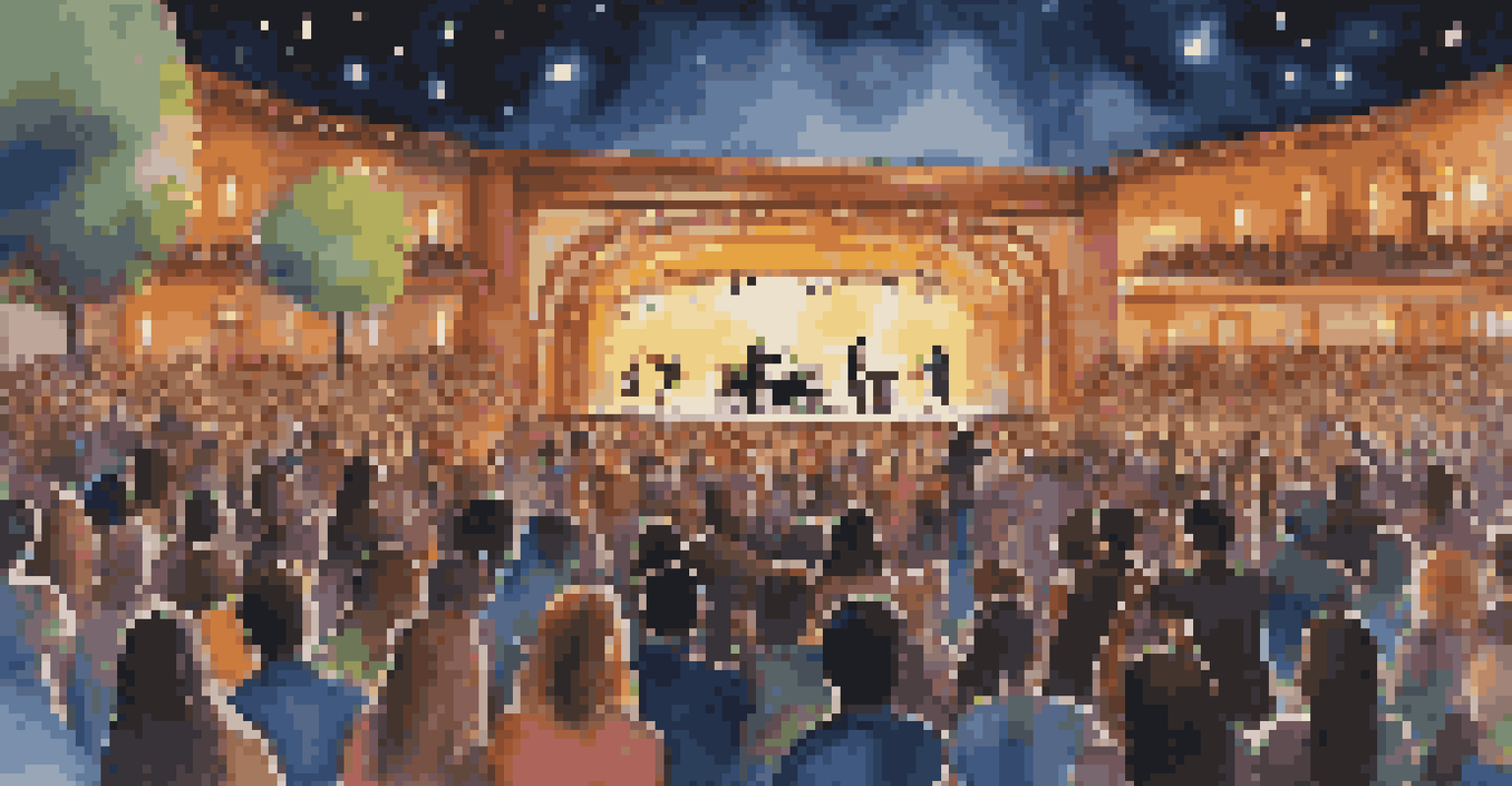The Intersection of Cultural Appropriation and Music Genres

Understanding Cultural Appropriation in Music
Cultural appropriation occurs when one culture adopts elements from another, often without permission or understanding. In music, this can manifest as artists borrowing styles, instruments, or themes from cultures that are not their own. While this exchange can foster creativity, it raises important questions about respect and representation.
Cultural appropriation is often seen as a form of exploitation, where one culture takes from another without understanding or respecting its origins.
For instance, consider how rock music has roots in African American blues. Many artists have credited these origins, yet the commercialization and mainstream success often overlook the original creators. This dynamic can lead to a sense of erasure, where the contributions of marginalized cultures are minimized.
Ultimately, recognizing cultural appropriation in music encourages us to celebrate diversity while being mindful of its implications. It's about finding a balance between appreciation and appropriation, ensuring that cultures are honored rather than exploited.
Examples of Cultural Appropriation in Popular Music
Numerous high-profile cases illustrate cultural appropriation in music, stirring significant debate. One example is the backlash against certain pop artists who have adopted hip-hop styles without acknowledging their origins. This can create a perception that these genres are merely trends, rather than rich cultural expressions.

Take Miley Cyrus, who faced criticism for her abrupt shift to hip-hop aesthetics during her 'Bangerz' era. Critics argued that she was benefiting from a culture that she had not genuinely engaged with. Such instances highlight the fine line between inspiration and appropriation.
Cultural Appropriation vs. Inspiration
Understanding the difference between respectful cultural inspiration and exploitative appropriation is crucial for artists.
These examples serve as a reminder for artists to tread thoughtfully, acknowledging the histories and communities behind the sounds they embrace. Artists can create deeper connections through respectful engagement with other cultures, rather than just adopting their elements superficially.
The Fine Line Between Inspiration and Appropriation
In the vast landscape of music, inspiration and appropriation can often feel like two sides of the same coin. While borrowing elements from different genres can lead to innovative sounds, artists must consider the context and implications of their choices. Inspiration often involves a respectful exchange, while appropriation can feel exploitative.
Art is a reflection of the times, but it should also be a dialogue among cultures, not a one-way street of appropriation.
For example, when an artist collaborates with a musician from another culture, it can foster a dialogue that enriches both parties. This kind of collaboration typically shows an awareness and appreciation for the cultural background involved, as opposed to mere imitation.
Navigating this line requires sensitivity and a commitment to understanding the cultural significance behind the music. By prioritizing authentic connections, artists can create music that resonates deeply while honoring its origins.
Impact of Cultural Appropriation on Artists
Cultural appropriation can have profound effects on the careers of artists, influencing both their perception and popularity. For some, adopting elements from another culture can lead to a surge in fame and commercial success. However, this can come at the cost of backlash from those who feel their culture is being misrepresented.
Consider the case of Kacey Musgraves, who has successfully integrated various influences into her country music without facing significant backlash. Her approach shows that artists can explore diverse sounds while remaining respectful and true to their roots.
Impact on Artists' Careers
Cultural appropriation can significantly influence artists' popularity, but it often comes with ethical dilemmas and backlash.
Ultimately, the impact of appropriation is complex and multifaceted. Artists must weigh the potential benefits of broader appeal against the ethical considerations of their creative choices.
The Role of Listeners in Cultural Appropriation
Listeners play a crucial role in the conversation around cultural appropriation in music. As consumers, they have the power to support artists who engage respectfully with different cultures while calling out those who do not. This collective awareness can encourage more responsible practices in the music industry.
When fans educate themselves about the origins of the music they love, they can appreciate it more deeply. Understanding the cultural contexts can transform how listeners engage with various genres, promoting a more inclusive appreciation of music.
Moreover, listeners can influence artists by demanding authenticity and accountability. By supporting musicians who prioritize respect for cultural origins, fans can help foster a music landscape that values diversity and genuine connection.
The Future of Music and Cultural Exchange
As globalization continues to shape the music industry, the conversation around cultural appropriation is more relevant than ever. New technologies allow artists from different backgrounds to collaborate like never before, creating opportunities for authentic cultural exchange. This evolution can lead to innovative fusions that celebrate diversity.
However, it remains essential for artists to approach these exchanges with care and respect. Acknowledging the roots of borrowed elements and fostering genuine partnerships can help prevent appropriation and promote a more harmonious music environment.
Listeners Shape Cultural Conversations
Listeners have the power to promote responsible practices in music by supporting artists who respect cultural origins.
Looking ahead, the future of music can be bright if we embrace the potential for respectful collaboration. By prioritizing understanding and appreciation, artists and listeners can work together to create a rich tapestry of sounds that honors all cultures involved.
Navigating Cultural Sensitivity in Music Creation
Creating music in a culturally sensitive way involves more than just avoiding appropriation; it requires a commitment to understanding and honoring diverse traditions. Artists can start by educating themselves about the cultural backgrounds of the influences they wish to incorporate. This knowledge can guide respectful collaborations and creative choices.
For example, an artist interested in incorporating traditional instruments can seek out musicians from that culture to collaborate with. This approach not only enriches the music but also fosters mutual respect and understanding, creating a more authentic sound.

Navigating cultural sensitivity is an ongoing process for artists. By remaining open to learning and engaging with various cultures, musicians can create works that truly reflect the beauty of diverse influences while avoiding the pitfalls of appropriation.